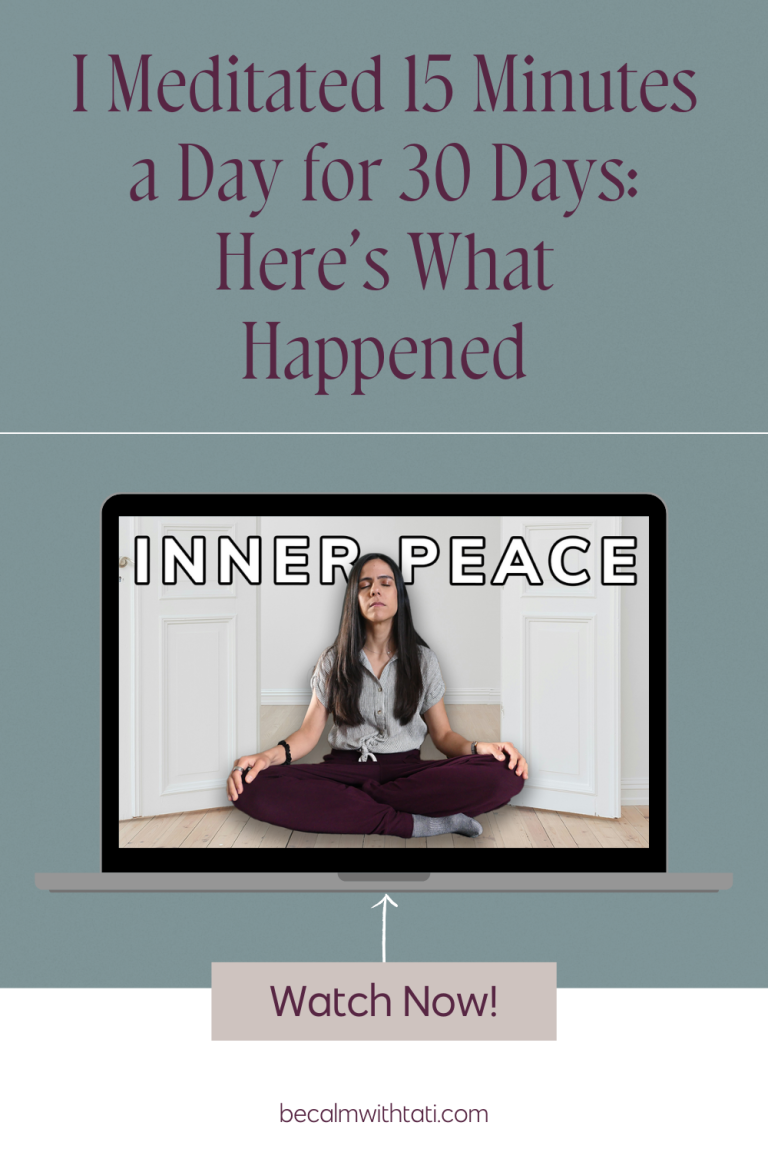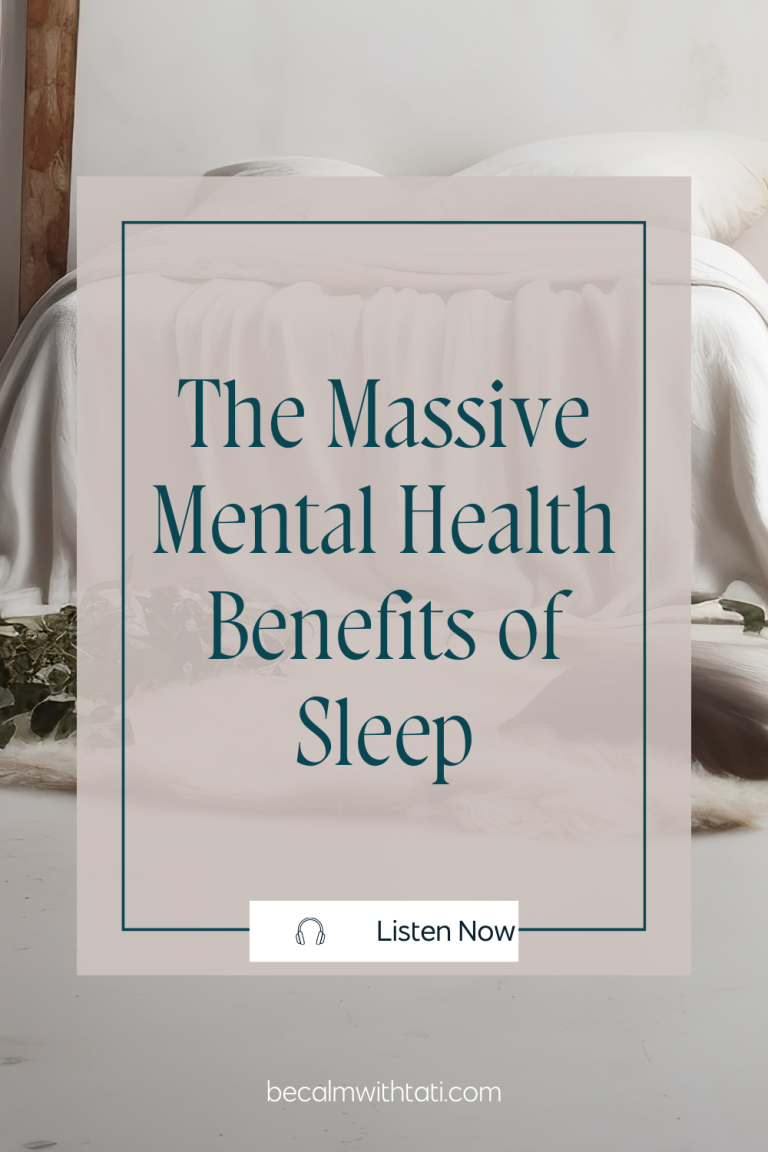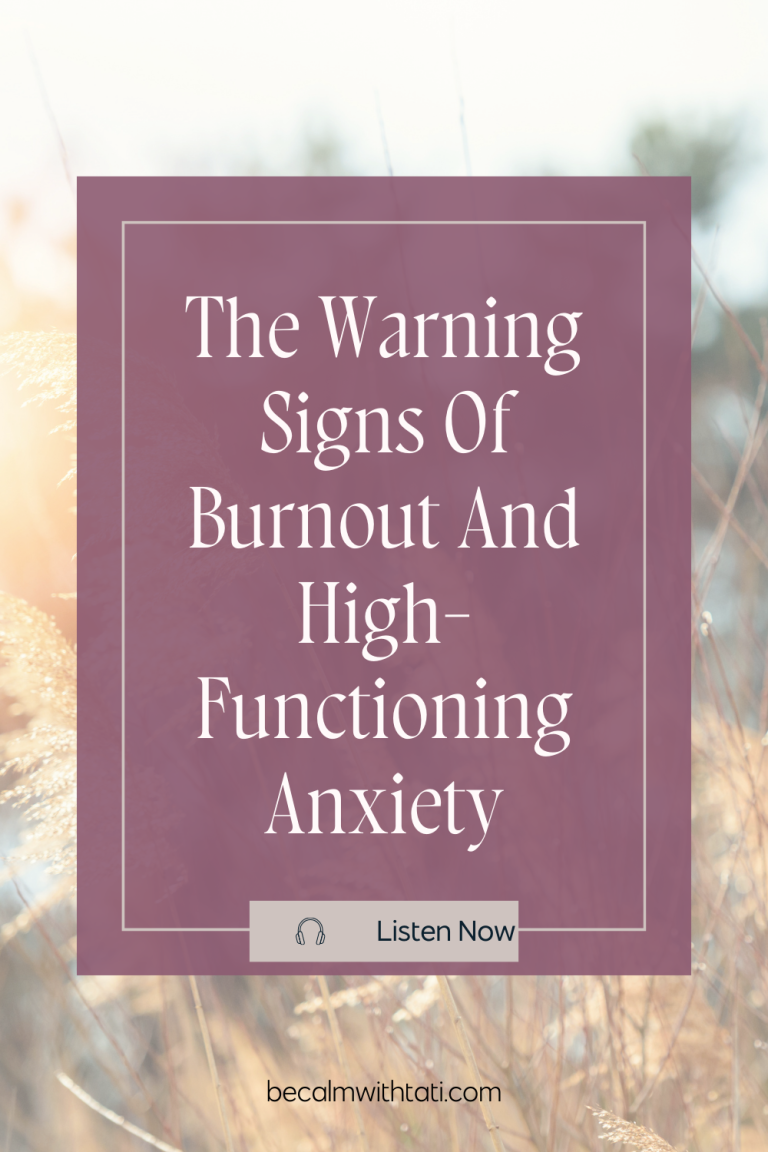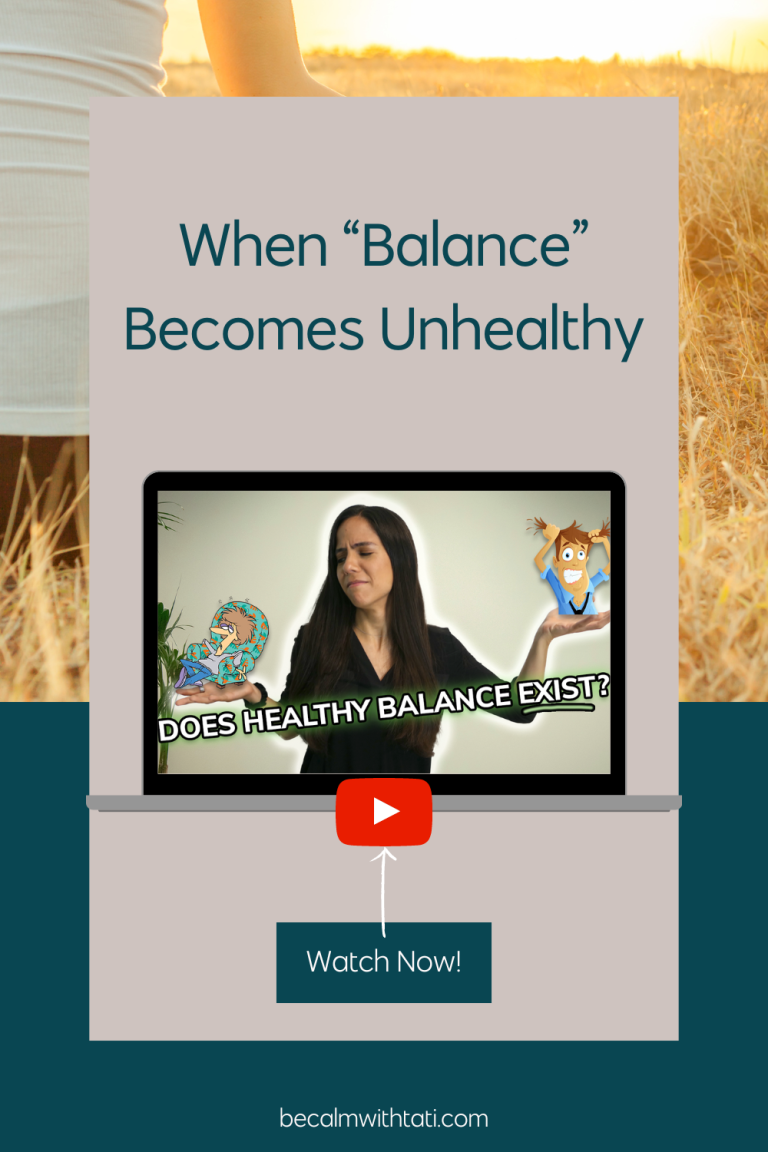Have you ever found yourself caught in a cycle of taking out your stress and frustration on the ones you love? Maybe you’re familiar with the guilt that follows, yet the pattern seems challenging to break. It’s a common struggle—one that impacts relationships and takes a toll on your well-being. In today’s episode, we’re diving into the intricacies of managing stress without harming the relationships that matter most. If you’ve ever found yourself snapping at or shutting down to those you love without meaning to, this episode is your guide to cultivating healthier relationships.
In this episode, you will learn:
- How taking out frustration on loved ones affects both individuals and the overall relationship dynamics
- How to recognize triggers and patterns of behavior that result in taking out stress on others
- Effective communication techniques to express frustration and stress without causing harm
Mentioned in episode:
50 Positive Coping Skills For Anxiety And Stress: https://www.becalmwithtati.com/coping-skills-for-anxiety-and-stress/
Do you need therapy: https://www.becalmwithtati.com/need-therapy/
LISTEN NOW:
🎧 CLICK HERE TO LISTEN TO CALMLY COPING WHEREVER YOU LISTEN TO PODCASTS
WATCH NOW:
TAKE THE FREE CHALLENGE: CALM YOUR OVERTHINKING MIND
FREE TRAINING: How to Create Work-Life Balance and Feel Calmer From Within
If you want to learn how to take back control of your life so you can feel calmer and more confident, and learn the tools to spend your time according to what matters most to you (no matter what your schedule is like right now)…
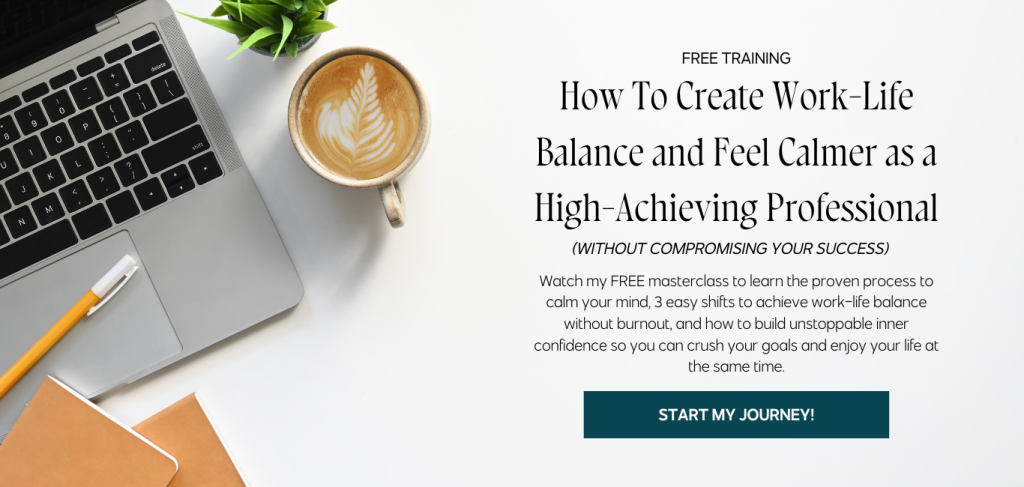
LISTEN, REVIEW, AND SUBSCRIBE TO THE PODCAST!
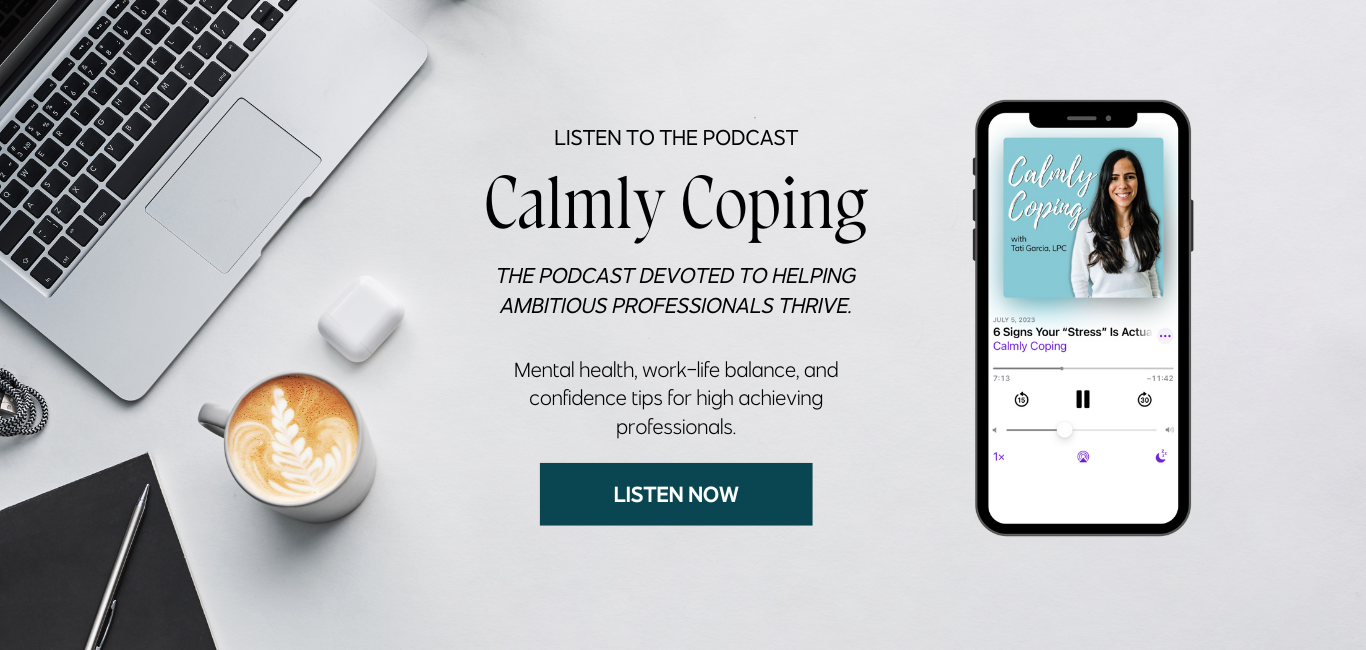
INTRO/OUTRO MUSIC: Rescue Me (Instrumental) by Aussens@iter (c) copyright 2018 Licensed under a Creative Commons Attribution (3.0) license. http://dig.ccmixter.org/files/tobias_weber/57990 Ft: Copperhead
DISCLAIMER: All content here is for informational purposes only. This content does not replace the professional judgment of your own mental health provider. Please consult a licensed mental health professional for all individual questions and issues.
Interested in diving deeper to get support for high-functioning anxiety?
I offer 1:1 coaching to help high-achievers overcoming high-functioning anxiety so they can feel calmer, more present, and have improved balance in their lives. Click here if you’re interested in learning more and getting started.
Calm, Balanced, & Confident is my comprehensive A→Z self-paced course to help high-achieving professionals overcome high-functioning anxiety so they can feel calmer, balanced, and more confident without the anxiety and overwhelm. Click here to learn more and enroll today.
Looking for ongoing support and guidance with high-functioning anxiety? The Calm & Ambitious Community is the exclusive community for high achievers with high-functioning anxiety. Click here to learn more and join us today!
TRANSCRIPT:
Click to view the episode transcript.
Have you ever found yourself caught in a cycle of taking out your stress and frustration on the ones that you love? Maybe you’re familiar with the guilt that follows, but the pattern seems impossible to break. It’s a common struggle, one that negatively impacts relationships and your own well being. In today’s episode we’re diving into the intricacies of managing stress without harming the relationships that matter most to you.
If you’ve ever found yourself snapping at or shutting down to the people that you love the most without meaning to, this episode is your guide to cultivating healthier relationships.
Welcome to Calmly Coping. My name is Tati Garcia. I’m a licensed therapist and coach specializing in high functioning anxiety. I help high achievers stop putting themselves last so that they can feel more calm, balanced, and confident from within. If this topic interests you, then please like, subscribe, and hit the notification bell so you’ll be notified every time I release a new episode.
Thank you so much for tuning in. So, This episode is coming out on Valentine’s Day, but really this is an honor of relationships of any kind. Whether it is a romantic relationship, whether it is a friendship or a family member, whether it is a work relationship, any kind of relationship, these tips can apply too.
And the reality is that we can often tend to show our worst to the people that are closest to us, and it can kind of seem counterintuitive sometimes because that’s often the last thing you want to do, because these are the people that mean the most to you. However, oftentimes when we feel comfortable around somebody and safe around them, then That’s when we feel safe expressing these strong emotions and taking out these strong emotions.
Also, because we often tend to spend the most time around these people that we’re closest to, then there can be situations for our stress to be triggered by certain things that these other people do and vice versa. And so that can also create an environment where you may be taking out stress or reaction to your own stress on those people closest to you.
And this is a question that has been asked of me many times. in my calm and ambitious private community, in emails from podcast listeners, how to deal with stress and relationships and how to stop taking out stress on those we love. So I want you to picture it. You’re feeling stressed. Maybe you have just finished or come home from a long day at work and you get a request from your partner or family member or roommate to help them out with something or to talk about something.
And it’s basically like the straw that broke the camel’s back. And because you’re feeling stressed, you feel like you can’t handle it and you overreact to that request. Maybe you yell at them. Maybe you say mean things that you later regret to them. Maybe you even shut down and avoid them and don’t even want to see them or talk to them.
These can be some common reactions that occur when you’re already in a place of feeling stressed and then it could be something minor or something that is important but that you just don’t have the capacity to address in that moment that results in these strong reactions. So it’s important to address these kinds of situations in order to maintain healthy relationships.
And by a healthy relationship, I just mean one where you feel like you can communicate your own needs and the other person or people in the relationship can communicate their needs as well. And you can feel heard and respected and validated. This stress is going to allow you to prevent things from snowballing and getting worse, whereas if you’re not addressing it, it’s something that can continue to happen over and over again and erode your relationships, erode the level of trust, erode the level of understanding within the relationships.
There is a psychologist and expert in relationships, John Gottman, has done some research and basically demonstrated that within relationships, and this is specifically within marriages, but I’m sure you can extrapolate this to other relationships, for every five positive things that are said within a relationship that equates to one negative thing.
So essentially what that means is that the negative things that we say in our relationships and to our loved ones hold a lot more weight than the positive things we say. And if you are finding that you’re in a place of stress and saying a lot more negative things because you’re in a negative state of mind.
And taking that out on your loved one, then that can have a negative impact on the relationship and how that person feels towards you. And it can also have a negative emotional toll. It can be very challenging being the person on the receiving end of stress that’s being taken out on you. Especially because our tendency as humans is to take things personally even if they’re not personal. So even if you may consciously know, all right, this person that I care about is stressed. And as a result, they’re just projecting that onto me and using me as an outlet for the stress that they’re experiencing. You may consciously know that or you may not, but there’s still going to be this automatic reaction to take it personally and to see it as this person is acting this way towards you or because of you.
And so because of that, that can erode the trust within relationships. It can erode the comfort level. It can just. erode feeling safe talking to this person because you’re concerned or afraid that they may continue to take out these strong emotions on you. It can also be negative for the person, you, that is taking out that stress because it can be difficult for individuals to know how to respond to that stress that’s being taken out on them.
So if you’re the person who is the projector of the stress, then you may find that you’re getting frustrated with the other person because they may not know exactly how to respond to or receive your stressful comments or the stress that’s being taken out on them, whether it is actively or passively.
And by active, I mean you are yelling or talking or saying negative things and passive would be that shutting down and avoiding. So the first step would be to identify triggers and patterns that you notice results in you taking out stress or taking out anxiety or any strong emotions on your loved ones.
You can do this by keeping track maybe over a week or more depending upon how often this happens for you of, okay, the moments where I am taking out this Stress on my loved one. What is happening beforehand? What does it look like when I do this so that you can gain an understanding of potentially what is triggering it?
So maybe if you notice it tends to happen, you know after a long day of work or on a Thursday evening when you’re feeling overwhelmed and just exhausted from the few days of work beforehand then that can give you some insight as to what’s happening for you and how the certain circumstances within your life could be contributing to a buildup of stress or if it’s around a specific topic.
So maybe if it’s somebody that you live with, whether it’s a roommate or a partner or a family member, maybe it tends to be around cleaning up around the house or the shared responsibility of chores. So if you can notice commonalities in either the topic of the session, what is triggering it or the patterns of what it looks like, that can help you to understand more what is happening, so then you can make changes to help you to get out of that place. Then it can be helpful to learn healthy communication strategies for within the relationship. So if you are not communicating yourself effectively, which often happens during moments of heightened stress and heightened emotions, then that’s going to oftentimes just result in a back and forth of he said, she said, or a back and forth of each partner or person being on the defensive and not necessarily result in any resolution.
When you’re able to communicate yourself clearly and effectively, that can actually solve problems. and prevent these patterns from continuing to occur. So you can express how you’re feeling without causing harm. So even something by upfront saying to this other person, I’m feeling really stressed right now.
I’m feeling really overwhelmed. This isn’t a good time to talk about this. Can we talk about this In a few hours when I’ve had some time to rest, can we talk about this on the weekend when I’m feeling more relaxed? And so that can be a way of delaying the conversation so that you’re not necessarily having a stressful or difficult conversation during a moment where you’re not ready to talk about it.
Another thing can be to, if this is in response to something that a loved one has said to you, to use an I statement to communicate how you’re feeling. So for example, saying I feel blank when you say blank. So for example, you could say, I feel frustrated when you continue to talk to me about doing the dishes because I need time to wind down after work.
Can you bring this up with me at a later time when I’ve had time to rest and recover? So that formula is saying, You know, I feel blank when you say blank because I need blank. And can you blank? I actually got this formula from a training that was in the mindfulness. com app. That is an app that I use regularly.
And I found that this kind of variation on I statements was really powerful. I actually have a link to that. app in the description if, if you’re interested in checking it out. But I think that this can be a helpful way to communicate yourself without getting caught in the blame game. And oftentimes it can help to have difficult conversations before you’re in a moment of heightened emotions.
Anytime heightened emotions are present, it’s going to make it harder to think clearly. It’s going to make it so that you’re more likely to say negative or harsh things. So once you’ve identified your triggers and patterns, then when you’re in a moment of good, calm, even neutral, then you can make a plan or have those conversations up front and let this person know.
I keep using the example of after work, but just as a, you know, one way of thinking of it on a weekend, letting this person know when I get finished with the work day, I tend to feel really stressed and I need time to wind down. Before having any conversations or before responding to any requests that you have from me.
Is it okay if you give me a half hour that I can take to wind down and then I can connect with you and then we can talk with each other about things that could be on our mind. So that can be one way to address this in anticipation so that you can try and prevent these patterns from recurring. So it’s really about being a detective and recognizing what’s happening and so then what can you do to try and change this to alter those automatic reactions that you’re finding yourself in.
Another step that can be helpful is finding an alternative outlet for your stress and anxiety. So finding a way to help you to release these emotions on your own so that you’re not necessarily taking them out on your loved one. Now that doesn’t mean that you can’t go to this person if you’re feeling stressed, if you’re feeling overwhelmed, and if you need to talk things through.
However, if It is a constant thing where you are consistently going to this person and reacting strongly because you’re stressed and relying on them as your only outlet. That can be really draining for the person on the receiving end. So that’s when it’s helpful to find ways yourself to work through what’s coming up for you.
So that can be just Anyway, that helps you to cope with strong emotions. So things like physical activity, exercise, getting that release of the tension or stress that could be building up in your body. It could be a creative outlet, like playing an instrument or doing a craft or drawing or writing. It could be things like mindfulness, journaling.
Those are all great ways when it comes to mindfulness of being present with your emotions and recognizing them and feeling them. And when it comes to journaling, that can be a great way of getting out what’s on your mind and releasing some of that built up stress that you may experience. So there are so many ways that you can cope with difficult emotions.
I have a resource of 50 coping skills, I believe that it is for stress and anxiety and I’ll leave a link to that in the description for this episode and if you’re looking to dive deeper on more support for calming your mind, especially if you’re somebody who struggles with feeling overwhelmed and has difficulty with winding down at the end of the workday, then I have a free course on how to calm your mind so that you can finally relax that I will link as well.
Another great outlet for stress and anxiety can be seeking the support of a professional. So if you’re finding that this is a pattern that you’re finding yourself caught up in, then it can be beneficial to seek out the support of a therapist or seek out the support of a coach or other professional that can help you to work through taking out this stress on loved ones.
I also have resources. You can check out the work with me link in the description or in the show notes of this episode. So you can learn more about the resources that I offer to help you when it comes to working through stress, recovering from burnout, and coping with anxiety. I also want to touch on the importance of addressing these conflicts after the fact.
So if you have noticed that you are taking out your stress on the loved one often, and maybe you are shutting down, or maybe you are yelling or reacting in a way that you are not happy with, then it can be really powerful to address this. And the sooner the better, of course, but it’s never too late. to apologize, to express how you feel, and whether it is regret about what you have done, or your actions, or whether it is seeking forgiveness.
We can’t always expect forgiveness from the other person. However, we can express that we feel sorry about our behaviors and actions. That can look like just being upfront and saying, I’m not happy with how I treated you yesterday, and I want to work on changing this and improving this. And you can sometimes recruit the assistance of the other person if it’s something they’re open to, such as saying, you know, when I get to this place.
Is it okay for you to point it out to me? And that can be a sign for us to take space from each other so that we’re not continuing to trigger the other person. And we can calm down, take a few deep breaths, take some space, and then return to this conversation at a later point. Or anything that you might need in that moment.
Or maybe when I’m stressed, I just need somebody to listen to me and to hear me out so I can get out what happened and what was challenging for me during my work. day. So this can be a great opportunity to express your needs and also ask the other person within the relationship to let you know what their needs are.
How can I support you or how can we work together to prevent this from happening in the future? So I hope these tips were helpful for you. You can Take what resonated with you and leave the rest when it comes to helping to prevent yourself from taking out your stress and frustration on your loved ones.
So those tips were to identify your triggers and patterns. Implement effective communication strategies. Find healthy outlets for stress and anxiety. And focus on repairing relationships and take steps to repair your relationships. I’d love to hear your thoughts on this topic. If you’re watching on YouTube or if you’re listening on Spotify, you can leave a comment letting me know what can you do to stop taking your stress out on loved ones, whether it is an action step that you have taken away from this episode or something that you have tried in the past or have found helpful for you personally.
While you wait for next week’s episode, I have other episodes about calming your mind, creating work life balance, and feeling more confident from within. So be sure to check out these episodes here. Thank you so much for tuning in today, and until next time, be calm.
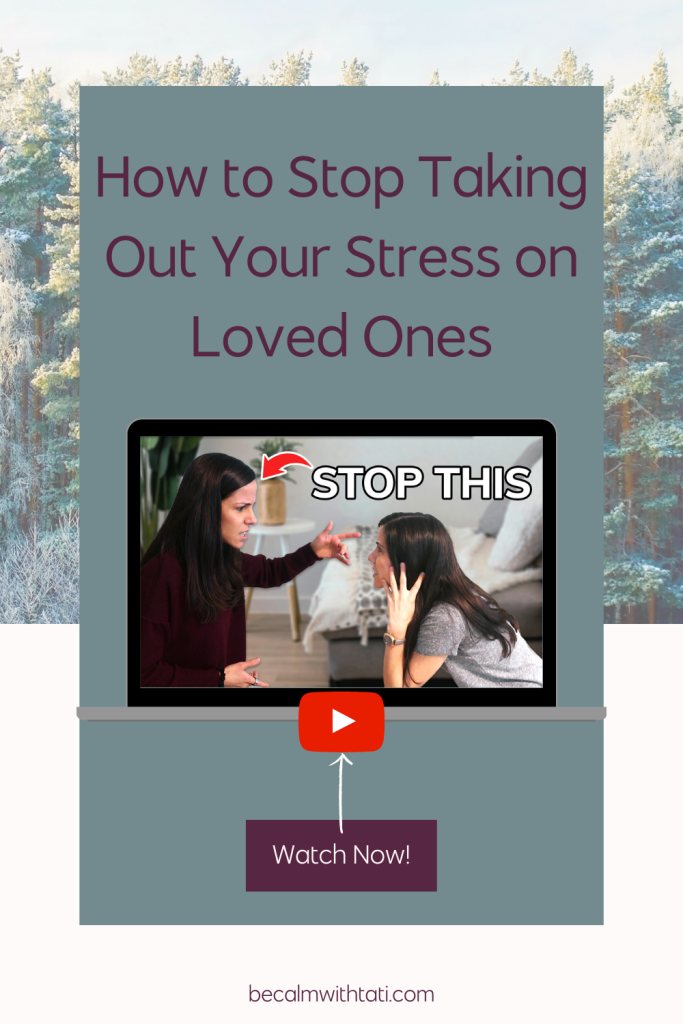
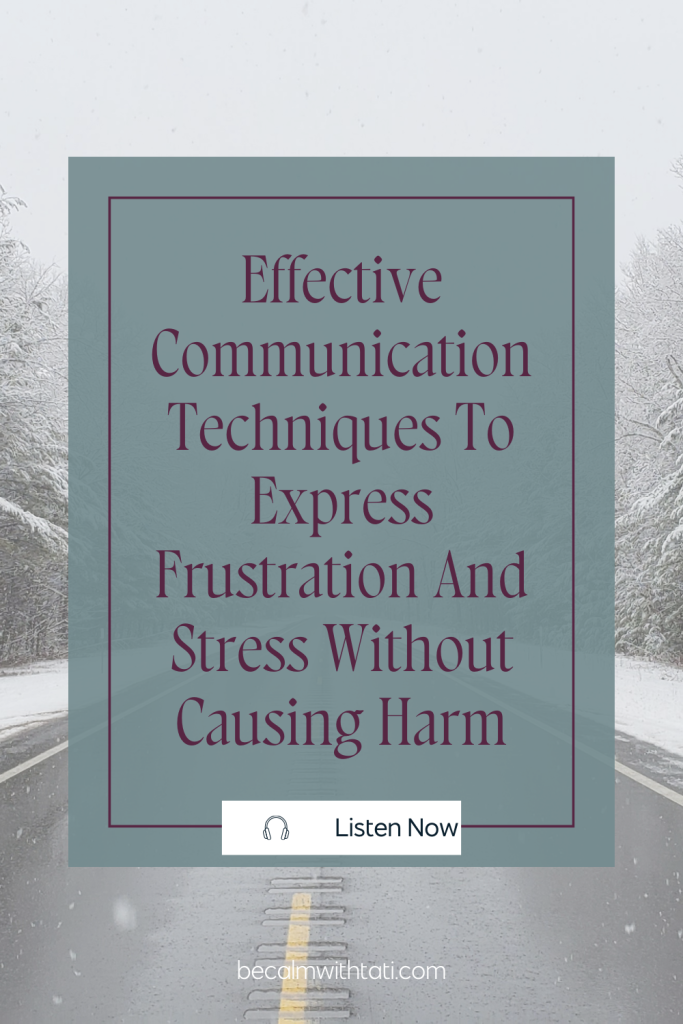
Until next time…




